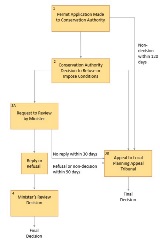Conservation Authorities Reimagined: Amendments to the Conservation Authorities Act Through Bill 229, Protect, Support and Recover from COVID-19 Act (Budget Measures), 2020
The provincial government proposes to revise the role and operations of Ontario’s conservation authorities. As part of Bill 229, the Protect, Support and Recover from COVID-19 Act (Budget Measures), 2020 (“Bill 229”), the province has proposed a number of amendments to the Conservation Authorities Act and also the Planning Act. The stated goals of the changes are improving transparency and consistency in conservation authority operations, strengthening municipal and provincial oversight and streamlining conservation authority roles in permitting and land use planning.
This bulletin will focus on the third category, namely how Bill 229 proposes to change the role of conservation authorities in relation to land use planning and development. These proposed revisions, if enacted, will make it easier to challenge the permitting decisions of a conservation authority, and also remove the ability of a conservation authority to participate in Planning Act appeals.
Summary of Proposed Changes to Permitting and Land Use Planning Roles
Bill 229 makes important changes to the role and function of conservation authorities in land development matters. The proposed changes do not remove the mandate of conservation authorities over watershed management. Rather, the amendments propose to create new appeal rights and augment existing ones in relation to the decisions of conservation authorities and limit their role in municipal planning processes.
1. No Conservation Authority Involvement in Planning Appeals
The most significant change to the status quo is proposed to the Planning Act, not the Conservation Authorities Act. Bill 229 proposes to eliminate a conservation authority’s participation in appeals under the Planning Act. The proposed amendments would make conservation authorities part of the province’s “one window” approach to planning. This would mean that a conservation authority, as a “public body” under the Planning Act, would lose the ability to appeal a municipal council’s decision to the Local Planning Appeal Tribunal (the “LPAT”). Further, a conservation authority would not be permitted to become a party to a Planning Act appeal.
2. New Development Permit Appeals Process
Bill 229 proposes to revise the appeal rights in relation to a conservation authority’s permitting process. Under the current statutory framework, despite any municipal permissions, a proponent is required to obtain a permit from the conservation authority for certain development activities within its watershed. If a conservation authority refuses the permit application or imposes conditions, there is a limited right to appeal to the Mining and Lands Tribunal (the “MLT”), who has been assigned the duties and functions of Minister to hear these appeals.
This appeal process would change significantly under Bill 229. The decision of a conservation authority to refuse a permit or impose conditions can be challenged in one of two ways: a Request to Review by the Minister or an Appeal to the Local Planning Appeal Tribunal.

i. Request to Review By the Minister
Where a conservation authority refuses a permit application or imposes conditions on the approval of a permit, the applicant may request that the Minister review this decision. This is an entirely new appeal process. The main difference between the proposed process and the current right to appeal to the MLT is that the Minister has the discretion whether or not to conduct the requested review.
Within 30 days of receiving a request for review, the Minister will reply indicating whether or not a review will be conducted. If the Minister does intend to conduct a review, the Minister must publish a notice of intention to review on the Environmental Registry within 30 days of giving a reply.
If the Minister refuses to conduct a review or fails to make a decision within 90 days of giving a reply, the applicant has a right to appeal to the LPAT (more below).
The Minister is not required to hold a hearing for the review, but may confer with any person or body that the Minister considers may have an interest in the matter.
The Minister must base the review decision on the same criteria the conservation authority is required to consider.
Upon conducting a review, the Minister may confirm or vary the conservation authority’s decision, or make any decision the Minister considers appropriate, including issuing a permit with conditions.
The Minister’s decision is final and not appealable, though an application for judicial review is always available.
ii. Appeal to the Local Planning Appeal Tribunal
As an alternative to a request to review by the Minister, a permit applicant has a new right to appeal to the LPAT. This is an entirely new mandate for the LPAT, having never heard direct appeals from a conservation authority decision. As an appeal to the LPAT overlaps with a request to review, it can only be made in limited circumstances, as described below.
A permit applicant may appeal a conservation authority’s decision directly to the LPAT within 90 days after receiving reasons from the conservation authority. However, if the applicant has also submitted a request for review to the Minister, the applicant cannot appeal to the LPAT unless:
- the Minister refuses to conduct a review, or
- the Minister has not made a reply within the 30-day time frame.
This presents the permit applicant with a choice: deal with a potentially contested hearing before the LPAT or request a review from the Minister at the risk of forgoing any further appeal right.
Upon receiving a notice of appeal, the LPAT is required to hold a hearing, on notice to all interested parties, and give direction for the hearing. As “interested parties” is not a defined class of individuals, it may be open to the LPAT to grant party status to individuals other than the conservation authority and the applicant, and possibly other affected parties.
Upon hearing an appeal, the LPAT may refuse the permit or order the conservation authority to issue the permit, with or without conditions.
iii. New Timelines for Decision Making
In line with appeal rights under the Planning Act, Bill 229 imposes decision making timelines on both conservation authorities and the Minister. In either case, failure to make a decision within the timeline gives an applicant the right to appeal directly to the LPAT:
- Permit Application to Conservation Authority – failure to make a decision on a permit application within 120 days after a complete application is made.
- Request for Review by the Minister – failure to give a reply to a permit applicant within 30 days of the request.
- Request for review by the Minister – where the Minister indicates an intention to conduct a review, failure to make a decision on a review within 90 days of giving a reply.
3. New Right to Appeal Permit Cancellation
Bill 229 also provides new appeal rights where a permit is cancelled by a conservation authority. Within 90 days of receiving notice of the conservation authority’s decision to cancel a permit, a permit holder may appeal to the LPAT. The LPAT would hold a hearing on notice to all interested parties. Upon hearing the appeal, the LPAT may confirm, rescind or vary the decision to cancel the permit, with or without conditions.
4. New Right to Appeal Permit Fee
A permit applicant previously had the right to request the conservation authority reconsider a fee it had charged. Bill 229 takes the reconsideration process one step further. A permit applicant will have the right to appeal to the LPAT in two instances:
- where the conservation authority fails to reconsider the fee within 30 days of the request, or
- if after the reconsideration decision, the conservation authority orders a permit applicant to pay the original or varied fee, and the permit applicant pays the fee under protest.
The LPAT would then hold a hearing and have the power to dismiss the appeal, vary the fee, or order that no fee be charged and have the power to order a refund.
5. Minister’s Order Making Power
Despite the above appeal rights, Bill 229 proposes to give the Minister a new power to override a conservation authority’s permitting powers. The effect of this power is that the Minister could unilaterally assume the jurisdiction of a specific conservation authority over a specific permit decision, or multiple conservation authorities over a more general class of permit decisions.
The Minister, by order, would be able to direct a conservation authority not to issue a permit to a person who wishes to engage in a specified activity, or may direct several conservation authorities specified in the order not to issue permits to persons who may wish to engage in a type or class of activity. An order would have the effect of allowing the Minister to “step into the shoes” of a conservation authority and unilaterally make permitting decisions. This includes decisions on current permit applications where a decision is pending and all future permit applications.
The Minister is required to give formal notice only to certain parties after an order is made. No advance notice of an order is necessary.
Whereas a conservation authority must hold a hearing if it refuses a permit application or imposes conditions, the Minister is not required to hold a hearing.
The Minister’s decision on a permit application is final. There is a narrow right to appeal to the LPAT only where the Minister fails to make a decision within 90 days. This appeal would be conducted in the same manner as an appeal from a non-decision of a conservation authority on a permit application or the Minister on a request to review a decision of a conservation authority. On appeal, the LPAT would have to dismiss the appeal or grant the permit with or without conditions.
Status of Bill 229 and Next Steps
Bill 229 received its second reading in the Legislature on November 18 and is currently under debate. It is expected that Bill 229 will be referred to the Standing Committee on Finance and Economic Affairs for further debate and public consultation. Modifications to the proposed amendments to the Conservation Authorities Act may or may not be made before the Bill is brought back to the Legislature for its third and final reading.
If passed by the Legislature, the proposed amendments to the Conservation Authorities Act will not come into force immediately, but on a day to be proclaimed by the Lieutenant Governor.
Members of our firm’s Municipal and Land Use Planning Group would be happy to discuss any questions you may have about Bill 229 amendments to the Conservation Authorities Act and Planning Act, or any other land development matter.

